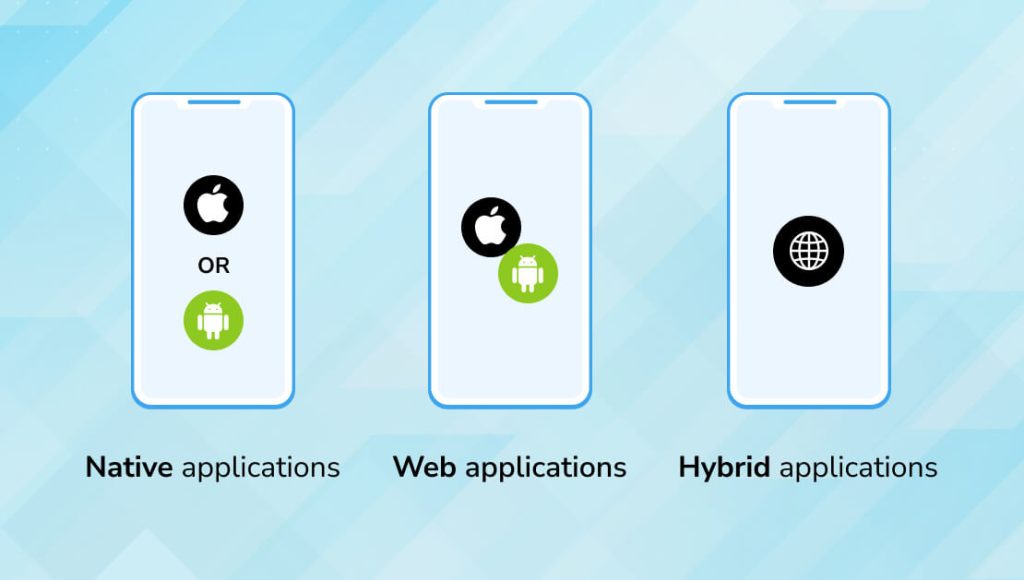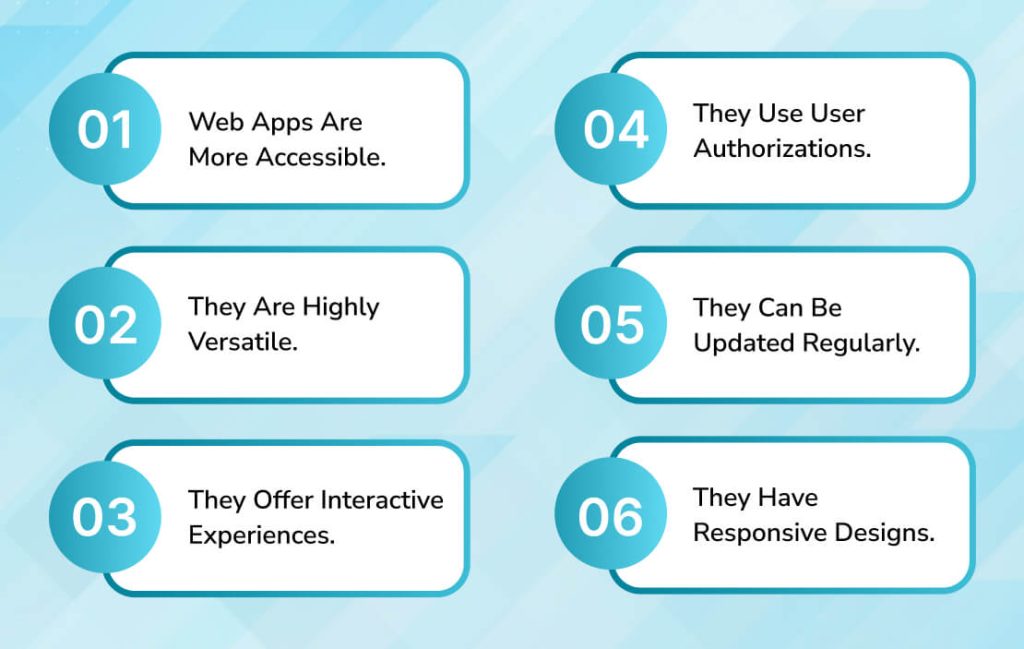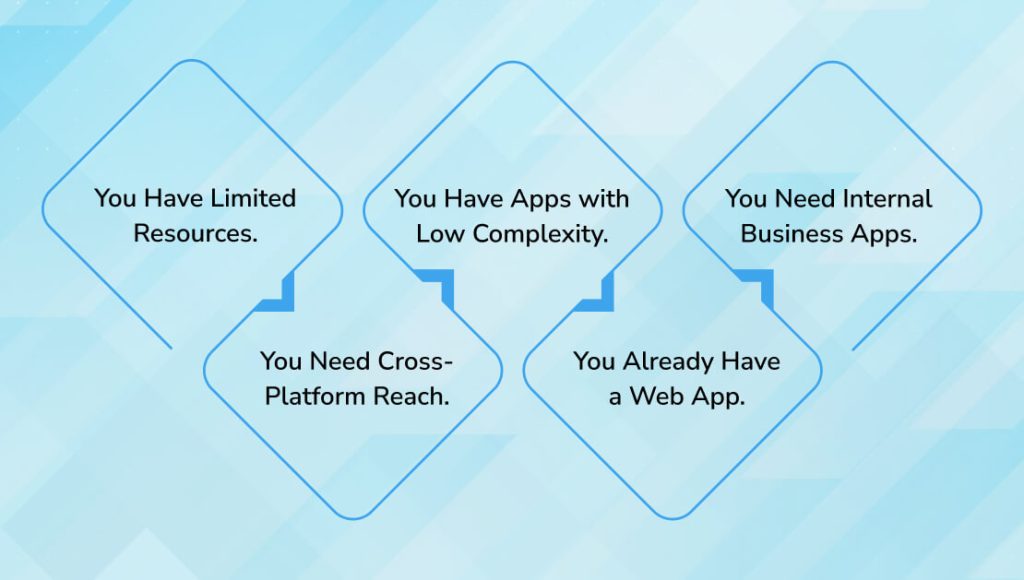Businesses aim to reach their customers faster and effectively, especially in a world where nearly everyone owns a smartphone. And mobile apps have become the go-to solution for achieving this goal.
Yet, thanks to the availability of different types of apps, such as hybrid, native, and web applications, businesses often find it hard to select the most suitable option that aligns with their objectives. This is a constant challenge clients face at our mobile app development company.
Resolving this challenge is complex and multifaceted. That’s why we decided to help you with this blog and simplify the process.
Our insights will give you a comprehensive understanding of all things related to mobile apps.
Types of Mobile Applications.

There are three mobile application types, each with its own design, architectural, and design styles.
- Native applications
- Web applications
- Hybrid applications
They are categorized based on the technology used to develop and present them.
Native Applications
Native apps are developed specifically to work on a platform like Android or iOS, taking full advantage of the device’s capabilities. This helps them offer the best possible user experience on the apps. Native apps are the go-to option for businesses that want to deliver the best user experience to their users.
Mobile app development companies use platform-specific languages. The technologies used to develop hybrid apps are Swift, Kotlin, Java, React Python, Objective-C, C++, etc.
Advantages of Native Apps
Native apps offer a plethora of advantages to businesses. Here are a few notable advantages to keep in mind.
They Offer Exceptional Performance.
Native apps are renowned in the tech community for their exceptional performance. As they are developed to take full advantage of the platform or OS, their performance is nothing but exceptional.
They Have Deep Device Access.
Native apps can access the device’s capabilities, such as the camera, GPS, accelerometer, sensors, etc. The access allows businesses to create feature-rich and highly interactive apps that can leverage these functions for the best user experience.
They Have Better Monetization Options.
App stores provide opportunities for businesses to monetize their native apps. You can do this with in-app purchases, advertising, subscription models, app sales, etc.
They Offer High Security.
Native apps can leverage platform-specific security features, encryption, and authentication methods. As these native apps handle sensitive user data, financial transactions, or confidential information and enjoy full device access, security is extremely vital.
They Offer Excellent User Experiences.
Native apps deliver a smooth and intuitive interface aligning with the device’s UI standards. For apps that require high-quality graphics and animations, this is crucial. The result is uncompromised user experiences.
Limitations of Native Apps
Although they are impeccable in most ways, they have the following limitations.
Native apps are expensive to build. This is because they need to be specifically developed for each platform.
Businesses may need to invest a lot of time to develop the app as they require more time to develop, unlike web or hybrid apps.
Native apps are specifically developed for each platform and cannot be used on any other device or platform.
Businesses may find it hard to maintain different versions of the app for different platforms. This leads to more expenses.
Developing native apps requires expertise in platform-specific programming languages. This leads to higher development costs as businesses need to hire mobile app development services for native apps specifically.
Although native apps provide some level of offline functionality, it pales in comparison to the functionality offered by web apps or hybrid apps.
Do you have questions about developing a mobile app? Learn more about our development service.
When to Use Native Apps for Your Business?
As a business, you must hire app development services from a company to create a native app in the following circumstances.
Deliver the Best User Experience.
When you need to deliver the best user experience and performance to your users without any compromise.
When Your Service Delivery Requires It.
You must develop native apps for your business if your service offerings depend on device features like GPS, camera, location, etc.
For Better Security and Safety.
If your app offers your users financial services, native apps are the best as they offer better security and safety.
For Game and Graphics-Intense Businesses.
Native apps are a must for businesses that develop and deliver gaming and graphic-intensive applications.
For Better Branding and Customization.
You can use native apps if you are extremely particular about branding and customization and you want to deliver brand-specific experiences to users.
Web Applications
These are mobile apps that users can access in a mobile web browser. They act as mobile apps, but they need web browsers to perform and help users interact with the app.
Some of the examples of web apps are WordPress, Facebook, Amazon, etc.
Web app development companies use different technologies to build web apps. Here are the popular technologies that we use at AddWeb Solution.
- HTML
- CSS
- JavaScript
- PHP
- Python
- Ruby on Rails
- NodeJS
Other technologies, such as Django, headless CMS, etc., are also used based on the type of project.
Advantages of Web Apps

Web apps offer a lot of advantages to businesses and here are a few important benefits of using web apps for your business.
Web Apps Are More Accessible.
Using a web browser, users can access mobile apps from anywhere on a variety of devices, such as computers, smartphones, tablets, etc. All they need is an internet connection.
They Are Highly Versatile.
Web apps are not confined to any type of device or mobile operating system. They can work on almost all devices and platforms as they are delivered via web browsers on mobile phones.
They Offer Interactive Experiences.
Web apps deliver interactive experiences to their users. They can also use forms, real-time updates, animations, data sharing, etc., which enables them to deliver a real app-like experience to the users.
They Use User Authorizations.
Web apps provide user authentication and authorization systems to monitor access and protect sensitive data. This enables businesses to control user behaviours on their platform and to ensure better safety for all users.
They Can Be Updated Regularly.
You can update web apps on the server. Hence, users can have access to the latest version without installing new app versions. This is the case with other types of mobile apps.
They Have Responsive Designs.
You can design your web apps to adapt to various screen sizes and orientations. As web apps operate via browsers, they provide consistent and user-friendly experiences to users across devices.
Limitations of Web Apps
There is no doubt that web apps have a lot of advantages for businesses and users alike. But they are also limited by certain drawbacks.
Here are some limitations of web apps you need to know before choosing to go with it.
- They are highly dependent on mobile browsers. If the web browsers are limited in function and capabilities, the apps also become limited.
- Compared to native apps, web applications are limited in terms of performance and speed due to heavy dependence on the internet.
- As web apps use the internet to deliver service, they cannot operate without the internet. This limits the usage of web apps.
- Web apps are delivered via browsers. Therefore, they have very limited access to the hardware capabilities of phones like camera, location, etc.
- Unlike native mobile apps, web applications cannot integrate with APIs or external services as they are tied to web browsers.
- Based on the browsers and devices where the browsers are hosted, the user experience of web applications can vary considerably.
When to Use Web Apps for Your Business?
Despite its limitations, web applications are the best for any business if they are looking to meet certain goals.
Choose if your goals align with the following:
Ensure Cross-Platform Accessibility.
You need an app that needs to be accessible on mobile phones, laptops, tablets, computers, etc. This allows you to reach customers on any device or platform.
Invest Less in App Development.
Any mobile app development company would tell you that developing web apps is cheap. Hence, if you have a limited budget but want to meet many people, web apps are the best option.
Need to Launch the App Faster.
The time to market for web apps is much less. You can reach a broad audience and reduce development time, all with a single codebase. You don’t need separate code for each platform. This makes web apps faster to develop.
Share Content Faster.
When your chief aim with the app is to deliver content and information, web apps are the best choice. Web apps can do the job well without the business to invest in native apps.
Easier Development.
Web apps are the go-to option for businesses that want faster and easier updates. You can make the updates and deploy them on the server. And the users will have the latest service without downloading anything.
Reach a Broader Audience.
If you are a business that’s looking to bring your services and offerings to a lot of people, web apps can quickly do that for you. You can reach people no matter what their platforms are. And you can do it affordably with web apps.
Hybrid Applications
These types of applications combine the elements of both web apps and native apps. Hybrid app developers are developed using technologies such as HTML, CSS, and JavaScript, which are used to create web apps. But the app is wrapped in a native app container to make it work as a native app.
They perform like a native app, and users can download them from app stores like native mobile apps. Some of the leading businesses, such as X (formerly Twitter), Evernote, Instagram, Uber, etc., are hybrid apps.
Mobile app development companies use a variety of technologies to build hybrid apps. The popular technologies we use at AddWeb Solution are given below:
- HTML
- CSS
- JavaScript
- Cordova
- React Native
- Ionic
- Xamarin
Advantages of Hybrid Apps
Hybrid apps bring numerous advantages to businesses. As they have the best of both worlds, organizations often prefer them.
Here are the benefits of hybrid apps to consider when building your next app.
They Work on Multiple Platforms.
Hybrid apps have the capability to work on multiple platforms like Android and iOS by using a single codebase. Hence, businesses can develop a single app that users on both platforms can use.
They Are Cost-Effective to Make.
Hybrid apps are quick to develop as they use the same codebase for all platforms. This reduces the time needed to develop apps for multiple platforms. The result is a more cost-effective solution that meets all your needs.
They Have a Short Time to Market.
Since you are going to develop your hybrid app faster, you can take it to market as quickly as possible. Also, the technologies used to develop hybrid apps are HTML, CSS, JavaScript, etc. You don’t need to spend time looking for app development to make hybrid apps.
They Are Easy to Maintain.
Updates and maintenance are more straightforward for hybrid apps. You can make changes on the server, and the changes are available to users. This saves you time, effort, and money.
They Can Access Device Features.
Hybrid apps can access device features, such as the camera, GPS, contacts, etc. This is made possible by hybrid app frameworks like Apache Cordova and React Native that offer plugins and APIs.
Limitations of Hybrid Apps
Businesses benefit a lot from using hybrid apps to reach more people and market services. However, the apps are not free from limitations.
Here are some of the drawbacks of hybrid apps for businesses.
- Despite offering better performance than web apps, hybrid apps fall short of the impeccable performance delivered by native apps.
- As hybrid apps are built on HTML, CSS, etc., and wrapped in a native container, they encounter platform-specific issues more often.
- Hybrid apps cannot take advantage of the device capabilities like native apps, although they are much better than web apps.
- As hybrid apps are built for platforms, when they are updated, apps also may need to be updated. This can be challenging for businesses.
- The process of debugging can be complex in hybrid apps due to the interaction between the codebase and the native wrapper.
When to Use Hybrid Apps for Your Business?

You can use hybrid apps when you want to cater to users on platforms like iOS, Android, etc., without having to develop apps for each of the platforms.
This also suits your business in the following scenarios.
You Have Limited Resources.
Hybrid apps are the best when your business has limited resources to invest in making apps for multiple platforms. You can save money and time using hybrid apps while getting better performance than web apps.
You Need Cross-Platform Reach.
This is the best option for achieving cross-platform reach without having to invest heavily in developing apps for each platform.
You Have Apps with Low Complexity.
When your business has an app that’s less complex and more straightforward for the users, hybrid apps are the best choice. They can still use the hardware capabilities without being complex.
You Already Have a Web App.
Hybrid apps are useful when your business already has a web app. With the help of a mobile app development company, you can convert the web app into a hybrid app faster.
You Need Internal Business Apps.
Businesses that need applications to use within their business among teams can take full advantage of hybrid apps. They are easy and quick to develop while also being able to offer remarkable performance.
Conclusion
Whether you need a hybrid, web, or native application for your business, AddWeb Solution can help you. Our team can offer customized mobile app development services based on your exact requirements. Over the course of a decade, we have worked with a variety of businesses looking for mobile app development services.
No matter what industry you are from, our team can help you out. We will also help you choose the type of app that your business needs based on your goals and expectations.
Talk to our client support team and learn how we can work together to help you realize your business goals with a suitable mobile app.
The choice of a mobile app depends on your business goals and needs. However, hybrid apps are the best option if you want to reach a wider audience without compromising user experience and security.
There are three types of mobile applications—native, web, and hybrid apps. Native apps are solutions developed for specific platforms. Web apps are applications that users can access via browsers. Hybrid apps are web applications wrapped in a native container for native app-like experiences.
It depends on the project you are working on. You can also conduct a competitive analysis in the industry to understand the features you need for your app. We can also help you decide the features you want for your app.
All three types of mobile apps, like web, hybrid, and native apps, can be used by businesses. However, the choice between the app is based on a range of factors like the business, users, services you offer, and more.
Developing benefits has numerous advantages, such as providing a better user experience, reaching a wider audience, bringing services faster to users, etc. it can help you serve your customers better, improve customer lifetime value, and generate more revenue.

